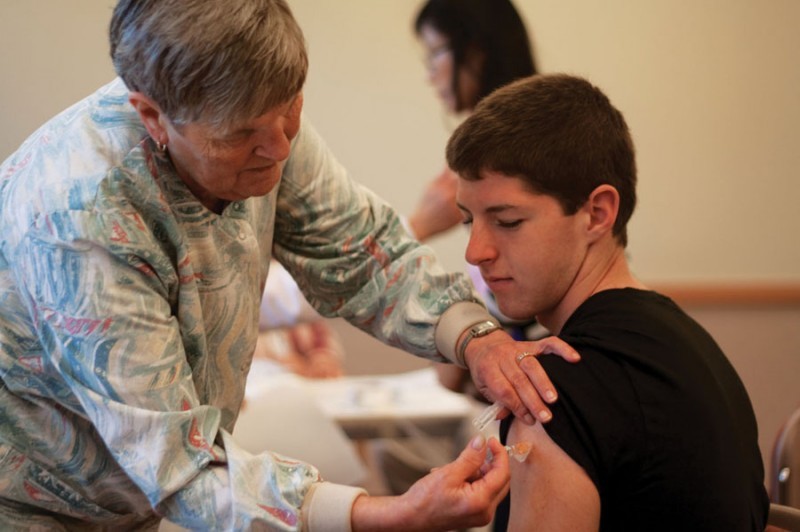Tips for staying flu-free this winter
Perry Martens, freshman in mechanical engineering, gets a flu shot Thursday, Sept. 30 in the Union Drive Community Center. Thursday was the last day the Thielen Student Health Center was offering flu shots in the UDCC, but they will still be giving flu shots and mists on Wednesday and Saturday mornings thru October.
December 1, 2011
Every year, many students catch the flu bug. Here are some things the Centers for Disease Control and Prevention suggests you do to stop the spreading of the flu.
First of all, how do you know if you have the flu? According to WebMD, “Flu, or influenza, is a contagious respiratory infection caused by a variety of flu viruses. Symptoms of flu involve muscle aches and soreness, headache and fever.”
Health providers follow the CDC guidelines to help prevent the flu. At the center’s website, the center lists three things that people can do to prevent the flu from spreading to others.
The first tip is to get the flu vaccine.
“Immunization is the primary medical intervention for the prevention of influenza to the individual and of the public as a whole,” said Dr. Scott Meyer,physician at Thielen Student Health Center.
According the CDC website, “The 2011-2012 vaccine will protect against an influenza A H3N2 virus, and influenza B virus and the H1N1 virus that emerged in 2009 to cause a pandemic.”
Students can get a flu shot at the Student Health Center on Wednesdays and Saturdays from 9:30 to 11 a.m, or they can call and make an appointment. It is $20 for the shot, and it will go onto your U-bill.
The second tip listed in the CDC guidelines is to “take preventive actions to stop the spread of germs.” That includes hand washing, covering your mouth when you sneeze or cough and if you use a tissue, make sure you throw it away.
“The No. 1 method of preventing flu and other viral illnesses is handwashing,” said Laura Knowles, nursing and patient services supervisor at the Student Health Center.
The CDC also recommends that people stay home for at least 24 hours after their fever is gone.
“It is recommended that if someone is ill with influenza-like symptoms, avoid contact with the public while they are ill,” Meyer said.
The third and final step is to take drugs prescribed by your doctor. These are antiviral drugs, not antibiotics.
“Antiviral drugs are different form antibiotics. They are prescription medicines [pills, liquid or an inhaled powder] and are not available over-the-counter,” the CDC website said.
The CDC website also said it is better to use these drugs earlier rather than later. The earlier you use them, the more effective they will be.
The flu can be dangerous to infants and elderly. Make sure you do your part and follow these three easy steps so you don’t spread it to anyone else.







